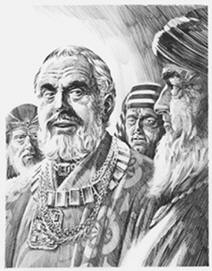The Gospels: Mark 3:20-27 – A Lesson About Envy
Then Jesus entered a house, and again a crowd gathered, so that he and his disciples were not even able to eat. When his family heard about this, they went to take charge of him, for they said, “He is out of his mind.”
And the teachers of the law who came down from Jerusalem said, “He is possessed by Beelzebul! By the prince of demons he is driving out demons.”
So Jesus called them over to him and began to speak to them in parables: “How can Satan drive out Satan? If a kingdom is divided against itself, that kingdom cannot stand. If a house is divided against itself, that house cannot stand. And if Satan opposes himself and is divided, he cannot stand; his end has come. In fact, no one can enter a strong man’s house without first tying him up. Then he can plunder the strong man’s house.
Jesus was made like his fellow humans in every way (Hebrews 2:17). In this passage we find that like many of our families, Jesus’ family was ready to have him committed. They came down to “take charge” of him, believing him to be out of his mind.
Blindness of envy
Among the reasons Jesus was considered out of his mind, Mark informs us, was that Jesus was running afoul of the authorities. He was banishing demons from people, and the authorities, who apparently weren’t, found Jesus’ growing popularity most irritating.
 If there is someone we’ve been disparaging, maybe it’s time to take our concerns to Christ the Redeemer instead of the grapevine. If there is someone we’ve been disparaging, maybe it’s time to take our concerns to Christ the Redeemer instead of the grapevine. |
It is a little reminiscent of Saul’s jealousy over David’s military success recorded in 1 Samuel 18. You might think a king would be grateful for the victories of a top general. But not so — Saul saw David as a threat. He feared the people might get the idea that David would make a better king.
The same dynamics seem to be at work between Jesus and the authorities. Jesus was getting too popular. His power over the evil spirits was plain, which made it obvious to everyone that he had the blessing and power of God.
So the authorities saw Jesus not as a blessing, but as a threat. Jesus was better liked than they were. And he was clearly more powerful.
So what to do? Discredit him, of course. But how? Well, let’s see — suppose we tell the people that he has power over the demons because he is demon-possessed himself. Yes! That’s the ticket! The man is demon-possessed, and not just by any demon, but this Jesus whom you are cheering is possessed by Beelzebul himself!
Truth aside
Truth was not the governing factor. God’s will was not a consideration. The joy of those freed from wicked oppression didn’t matter. There was only one goal — discredit anyone who makes us feel insecure. Say whatever has to be said.
The accusation, of course, was absurd, and Jesus exposed it as such. “If Satan opposes himself and is divided,” Jesus said, “he cannot stand; his end has come.”
But Jesus’ remark was deeper than merely exposing the silliness of the authorities’ accusation. The truth was, Satan’s end had come, but not because Beelzebul was kicking out demons through Jesus.
The end of Satan’s kingdom had begun because the Son of God had walked onto the stage of history. Jesus continued: “In fact, no one can enter a strong man’s house and carry off his possessions unless he first ties up the strong man. Then he can rob his house.” Jesus was freeing people from demons because Satan had no power to stop him.
And the authorities knew that. They were not blind. They saw the works of deliverance. But it is possible, even for us, to become so selfishly oriented that we place the preservation of our personal goals above even the hand of God.
Redemption
John wrote, “If we walk in the light, as he is in the light, we have fellowship with one another, and the blood of Jesus, his Son, purifies us from all sin” (1 John 1:7). When our trust is in Jesus Christ (which is the same thing as walking in the light), we have fellowship with one another. This is a fellowship that breaks through the walls of self-centered living. People matter to us.
Jesus told the disciples: “A new command I give you: Love one another. As I have loved you, so you must love one another. By this everyone will know that you are my disciples, if you love one another” (John 13:34-35). Just as light overpowers darkness, so love leaves no place for selfish envy.
Jesus was not a person to the authorities. He was an obstacle, a faceless object to be cleared out of their path. He didn’t matter. Have you ever been treated that way? Take heart: Jesus traveled that path before you. He knows what you’re experiencing.
Have you ever treated someone else that way? Take heart: Jesus has forgiven you. And if you will receive it, he gives you a heart that can see people as people, not as obstacles in your path. Let’s agree to take a look at the relationships in our lives. If there is someone we’ve been disparaging, maybe it’s time to take our concerns to Christ the Redeemer instead of the grapevine.
For reflection
- Has someone received a blessing you felt should have come to you? How have you responded? How have you treated that person?
- Have you been mistreated recently? How have you coped with it? Have you asked God for his peace (Phil. 4:7)?
Author: J. Michael Feazell, 20014, 2012
